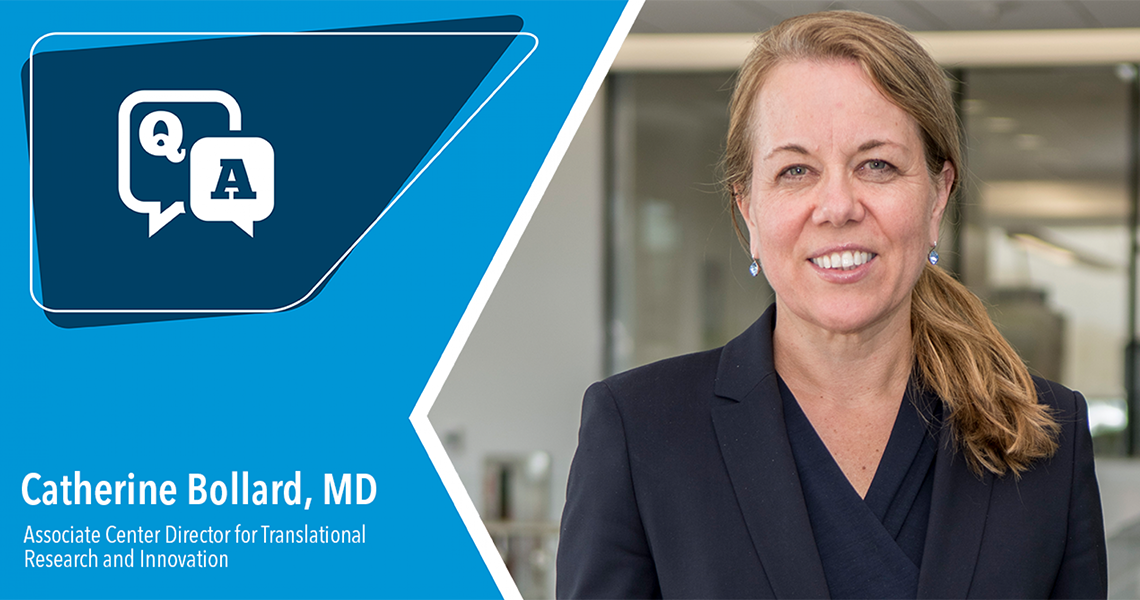Dr. Bollard is an internationally recognized leader in the fields of immunology and immunotherapy. She also serves as director of the Center for Cancer and Immunology Research at the Children’s Research Institute at Children’s National Health System and as a professor of pediatrics and microbiology, immunology and tropical medicine at the GW School of Medicine and Health Sciences. Dr. Bollard has been in her current role with the GW Cancer Center since June 2018.
What brought you to GW?
I moved to Children's National Medical Center (CNMC) and GW from Baylor College of Medicine in Houston, Texas in 2013 to build a novel cell therapies program here in D.C. I had worked in Houston for 13 years where I "grew up" in the cell therapy field under my esteemed mentors Drs. Brenner, Heslop and Rooney. It was therefore an extremely exciting opportunity to develop my own cell therapy program in D.C.
How did you decide on a career in the cancer field?
When I was 18 years old, I had to decide between medical school or opera singing. I chose medicine, thinking that I could revisit singing after qualifying -- and I continued my voice training throughout medical school. After obtaining my medical degree, I moved to London to continue my opera training at Guildhall. But my husband was a musician too, and it was hard for a couple of poor musicians to live in London! I did a locum at St. Bartholomew's in pediatric hematology and oncology - and I absolutely loved it. One day, when I was exhausted after being on call for 96 hours, my music teacher told me that I had to give up medicine. Medicine or singing. It was heart-wrenching, but I opted for medicine. I still keep up the music as a hobby - and I think the characteristics of a good doctor are similar to those of a good musician: one fixes the body and the other mends the soul.
If you weren't in medicine, what would you be doing?
Singing opera.
What inspires you most about your work?
I am most inspired about seeing our novel cell therapies translated from the bench to bedside to treat patients, many of whom have exhausted all other therapeutic options. Knowing that patients who were told their only choice was palliative care are alive and well today after receiving novel cell therapies we have developed is an indescribable feeling. In addition, I am incredibly inspired by those I mentor and fostering them and watching them grow into the next leaders of tomorrow. These are the most inspiring and rewarding aspects of my work.
Can you briefly describe the field of translational research? How do discoveries in the lab ultimately become the latest treatments for patients?
Translational research to translate lab discoveries to the clinic requires team science. I am incredibly lucky to work with an incredible team at Children's National Medical Center and GW including incredibly talented scientists with basic science, translational science and Good Manufacturing Practice (GMP) expertise as well as physicians, physician scientists and regulatory experts. It is important to acknowledge all these critical members of the team who are responsible for making this happen. In particular, at CNMC the leader of the translational research cell therapy lab is Dr. Michael Keller, the GMP Director is Dr. Patrick Hanley and the head of Clinical Research/Regulatory Affairs is Dr. Fahmida Hoq. At GW, the leaders of the translational research cell therapy lab are Dr. Russell Cruz and Dr. Rohan Fernandes, the GMP Director is Dr. Eric Yvon and the head of BMT/Cell Therapy is Dr. John Barrett. These amazing people along with all the other incredible faculty and staff work tirelessly toward a common goal of improving the lives of te pediatric and adult patients by developing and translating these novel cell therapies.
What is a current project or work you are excited about and why?
We have many exciting projects so it is difficult to highlight just one or two. But one of our exciting therapies that we are evaluating in both pediatric and adult patients is the use of tumor killing T cells (TAA-T) for patients with relapsed solid tumors (this trial is led by Dr. holly Meany at CNMC and Dr. Kieron Dunleavy at GW) and blood cancers (led by Dr. Kirsten Williams at CNMC). In these dose finding studies we are seeing that remarkably over 50% of patients are responding on the highest dose level without significant toxicity. Given the fact that these patients had exhausted all other therapeutic options and yet several patients are still alive (including remission in some) over a year later is remarkable and incredibly exciting for our future developments as we seek to treat patients with cell therapies earlier in the disease process.
In addition to your role as an associate center director, you also direct the Cell Enhancement and Technologies for Immunotherapy Program at GW and Children's National. How does your on-the-ground work in the lab shape or inform your vision for the Cancer Center?
The vision for the Cancer Center is to create a cancer-free world through groundbreaking research, innovative education and equitable care for all. Our track record of successfully translating novel cell therapies from the bench to the bedside to transform the lives of cancer patients absolutely speaks to this vision which I continue to focus on in my role as associate center for translational research and innovation.
What advice would you give to an aspiring cancer researcher in your field?
This is a challenging field but an incredibly rewarding one. Work hard, always stay true to your goals and aspirations and never lose sight of what is important to you. Always stay passionate about what you do and never forget to have fun.




